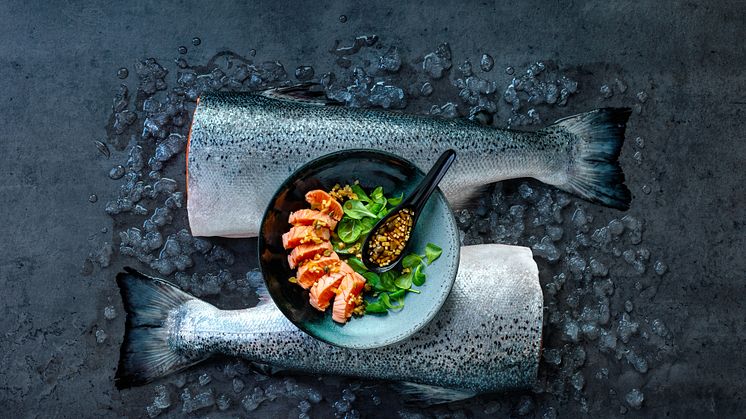
Press release -
October is a new strong month for Norwegian seafood exports
Norway exported seafood worth NOK 12,1 billion in October, an increase of NOK 1,6 billion, or 15 per cent, compared with October last year. So far this year, the export value is NOK 9,5 billion ahead of last year.
"Even though the corona pandemic is not over, the export value of Norwegian seafood continues to increase. This is the highest value measured in a single month. The previous record was from September", says CEO Renate Larsen with the Norwegian Seafood Council.
Robust trading
The solid increase in value in October can be explained, among other things, by the steadily growing number of export markets. While in October 2011 Norwegian seafood was exported to 97 markets, the corresponding figure for October this year has increased to 115.
"This trend shows how robust Norwegian seafood is as a global commodity. This is despite the krone exchange rate strengthening by around 10 per cent against the euro and the dollar. That export value is still so high only confirms how strong demand is now", says Renate Larsen.
Salmon and herring are the drivers
Measured in value, Poland, Denmark, France, the Netherlands and the USA were the largest markets for Norwegian seafood exports in October. Growth is driven by salmon and herring.
"Salmon accounted for 66 per cent of the total seafood exports this month, while the export value for herring in October is the highest single month in over 10 years", says Renate Larsen.
A key contributor
"The government has a goal of increasing exports excluding oil and gas by at least 50 per cent by 2030. Here, seafood exports will be a significant contributor, and the record figures for October show that the industry is well on its way. We expect a new record year. The government will facilitate further growth to create more secure full-time jobs in coastal communities, more processing, greater value creation and increased export revenues", says Minister of Fisheries and Marine Affairs Bjørnar Skjæran (Labor Party).
Here are the numbers for seafood exports so far in 2021:
- So far this year, seafood worth NOK 96.8 billion has been exported
- This is 16 per cent higher than in the same period last year
- NOK 9.5 billion ahead of the same period last year
Strong salmon growth
- 128,498 tonnes of salmon worth NOK 8 billion were exported in October.
- The volume increased by 8 per cent.
- The value increased by NOK 1.6 billion, or 24 per cent, compared with October last year.
- Poland, France and Denmark were the largest markets for Norwegian salmon in October.
Paying more for fresh salmon
Measured in value, France and the Netherlands were the largest emerging markets in October.
"These are two markets that on average pay more for fresh whole salmon compared to the largest market Poland. On average, the export price to Poland was NOK 53.18 per kg, and NOK 58.95 per kg and NOK 58.87 per kg to France and the Netherlands, respectively", says Paul T. Aandahl.
Good growth in France
"Through many months of strict restrictions and closed restaurants, many French people learned to make more salmon at home. The strong figures in October indicate that these positive trends will continue even after the reopening this summer", says Trine Horne, the Norwegian Seafood Council's envoy to France.
She also notes that several new products have made it easier for consumers to cook salmon at home.
"There are many positive trends in time that play on the team with the salmon in France. Considering that it is during the Christmas season that the French eat the most salmon, our export prospects look very bright going forward", says Trine Horne.
Decline for trout
- 6,210 tonnes of trout worth NOK 397 million were exported in October.
- Export volume fell by 11 per cent.
- The value of exports increased by NOK 30 million, or 8 per cent, compared with October last year.
- Belarus, Japan and the USA were the largest markets for Norwegian trout in October.
Fall for fresh cod
- Norway exported 1,826 tonnes of fresh cod worth NOK 89 million in October.
- The volume fell by 3 per cent.
- The value increased by NOK 4,8 million, or 6 per cent, compared with October last year.
- Denmark, Sweden and Spain were the largest markets for fresh cod from Norway in October.
Decline for frozen cod
- Norway exported 4,600 tonnes of frozen cod worth NOK 210 million in October.
- There is a reduction in the volume of 12 per cent.
- The value fell 6 per cent compared to October last year.
- The United Kingdom, China and the USA were the largest markets for frozen cod from Norway in Octobe
Fillet growth to the UK
"Exports of frozen whole cod have decreased by as much as 24 per cent or 1,000 tonnes. The fall is most visible towards the Chinese market while fillet exports increase by 29 per cent, or 228 tonnes. Fillet exports to the UK continue to grow and have increased 84 per cent, or 207 tonnes, to a new total export volume of 454 tonnes in October”, says Eivind Hestvik Brækkan, Seafood Analyst with the Norwegian Seafood Council.
Clipfish exports decline
- Norway exported 11 000 tonnes of clipfish worth NOK 634 million in October.
- There is a decrease in volume of 2 per cent.
- The value increased by NOK 19 million, or 3 per cent, compared with October last year
- Portugal, Brazil and the Dominican Republic were the largest markets for Norwegian clipfish in October.
- Clipfish exports of saithe decreased by 11 per cent, compared with October last year.
Clipfish exports of saithe decreased by 11 per cent, compared with October last year.
Promising levels of demand
In Portugal, the proportion fully vaccinated is at the top of the world. The last steps are now being taken towards normalizing society as it was before the pandemic started.
"Considering that as much as 20 per cent of all the world's cod is eaten in Portugal, it is very positive that society is about to normalize. If tourism eventually returns, this bodes well for the demand for clipfish, says Johnny Thomassen, the Norwegian Seafood Council's envoy to Portugal.
Saltfish decline
- Norway exported 2,400 tonnes of salted fish worth NOK 127 million in October.
- There is a reduction in the year-on-year export volume of 8 per cent.
- The value fell by NOK 3.6 million, or 3 per cent, compared with October last year.
- Portugal, Italy and Greece were the largest markets for Norwegian salted fish in October.
"Salted fish exports to Portugal fell 17 per cent, or 222 tonnes, compared to October last year. To Italy, our second-largest market in October, exports increased by 21 per cent or 93 tonnes. So far this year, however, exports of whole salted cod to Portugal are 9 per cent higher than last year”, says Eivind Hestvik Brækkan.
Export value increases for stockfish
- Norway exported 624 tonnes of stockfish worth NOK 115 million in October.
- There is an increase in the volume of 16 per cent.
- The value increased by NOK 19 million, or 20 per cent, compared with October last year.
Stockfish exports to Italy have continued to grow in October, with a 56 per cent increase in export volume. So far this year, stockfish exports to Italy are 23 per cent, or 349 tonnes, higher than at the same time last year.
Changed consumption pattern
“For stockfish, we are now well on track for exports in 2021 to return to the levels we saw before the pandemic. The export value of whole stockfish of cod to Italy so far this year is the third-highest ever. We also see that changing consumption patterns mean that the grocery trade becomes a more important channel for various products”, says the Norwegian Seafood Council's envoy to Italy, Gunvar L. Wie.
Good year for herring
- Norway exported 52,000 tonnes of herring worth NOK 695 million in October.
- The volume increased by 70 per cent.
- The value increased by NOK 302 million, or 77 per cent compared with October last year.
- Egypt, Germany and Poland were the largest markets for Norwegian herring in October.
A strong export month
"October was a solid export month for herring. We have to go back to 2011 to find higher export value in a single month. The increased quota for Norwegian spring-spawning herring and earlier autumn season are essential reasons why the volume in October is higher than last year and previous years", says Jan Eirik Johnsen, Manager Pelagic Species with the Norwegian Seafood Council.
Increased consumption in the markets
At the same time, the pandemic has led to increased consumption in the markets, which is reflected in good demand.
"Usually, the prices will fall with increased supply, but this year we see that they have improved on all herring products, which gives a significant increase in value", says Jan Eirik Johnsen.
Decline for mackerel
- Norway exported 60 877 tonnes of mackerel worth NOK 917 million in October.
- There is a decrease in volume of 18 per cent.
- The value fell by NOK 284 million, or 24 per cent, compared with October last year.
- Japan, South Korea and China were the largest markets for Norwegian mackerel in October.
"We now see the effect of the record-breaking start to the season. October is usually the peak month for mackerel exports, but the peak was reached in September this year. Increased demand and lower catches have also led to a price increase in some markets", says Jan Eirik Johnsen, Manager Pelagic Species with the Norwegian Seafood Council.
New export record in 2021
So far this year, mackerel has been exported to a value of NOK 4.7 billion. That is 1.2 billion, or 33 per cent, more than in the record year 2020.
Export volumes have also set a new record so far, with 325,000 tonnes. The previous record for the first ten months of the year was from 2014 with 318,000 tonnes.
Decline for king crab
- Norway exported 106 tonnes of king crab worth NOK 47 million in October.
- There is a decrease in volume of 56 per cent.
- The value fell by NOK 31 million, or 40 per cent, compared with October last year.
- France, the USA and Canada were the largest markets for Norwegian king crab in October.
Lower landing volume of king crab results in lower export volume than October last year, which was a strong month for both live and frozen king crab from Norway.
Strong first half
"The strong demand so far this year has led to much larger volumes being landed in the first half of the year compared to last year. This affects the quota and what remains to be fished for the last six months. Some vessels have already fished up their quota, while others have little left. In addition, many vessels have a lot left in their cod quota, which also helps to shape the picture", says Josefine Voraa, Manager for Shellfish with the Norwegian Seafood Council.
Decline to Asia
Norway exported 60 tonnes of live king crab worth NOK 25 million in October. There is a decrease of 52 per cent in volume and 32 per cent in value."While exports of live king crab to Asia were reduced by 71 per cent in October, it increased to North America by 24 per cent. But the growth in the USA and Canada, respectively, is not enough to address the decline to Asia, where the Norwegian king crab has faced intense competition from Russian king crabs", says Josefine Voraa, Manager for Shellfish with the Norwegian Seafood Council.
Decline for frozen king crab
For frozen king crab, 46 tonnes were exported in October to a value of NOK 21 million. This is a decrease in volume of 55 per cent and 44 per cent in value compared to what was a very strong October last year.
Strong increase to France
So far this year, the USA and Japan have accounted for 52 per cent of the exports of frozen king crab, but in October, only 3 tonnes went to Japan and nothing directly to the USA. For France, on the other hand, October is the strongest single month, with 27 tonnes worth 10 million. This is an increase of 566 per cent, or 23 tonnes, compared to October last year, says Josefine Voraa, Manager for Shellfish with the Norwegian Seafood Council.
The snow crab quota was already fished in July
- 2 tonnes of snow crab worth NOK 640,000 were exported in October.
- There is a reduction in the export volume of 66 per cent.
- The value fell by NOK 372,000, or 37 per cent, compared with October last year.
- Hong Kong SAR, Spain and the Netherlands were the largest markets for Norwegian snow crab in October.
The reason for the decline in exports in October is that Norwegian vessels had fished up the entire quota already in July this year.
In the first ten months of the year, snow crab was exported for NOK 810 million, an increase of 201 per cent, compared with the same period last year.
Decline for prawn
- 1,466 tonnes of prawns worth NOK 83 million were exported in October.
- There is a reduction in the export volume of 16 per cent.
- The value fell by NOK 9 million, or 10 per cent, compared with October last year.
- Sweden, the United Kingdom and Iceland were the largest markets for prawns in October.
Topics
Categories
The Norwegian Seafood Council works with the Norwegian fisheries and aquaculture industries to develop markets for Norwegian seafood through local market intelligence, market development and reputational risk management. The Seafood Council is headquartered in Tromsø and maintains local representatives in twelve of Norway's most important international markets. The Norwegian seafood industry finances the activities of the Norwegian Seafood Council via a tariff on all Norwegian seafood exports.
The Norwegian Seafood Council is a public company owned by the Ministry of Trade, Industry and Fisheries.




